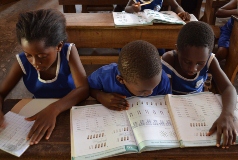An event held last week, co-hosted by World Bank President Yong Kim, UN Secretary-General Ban Ki-moon and UN Special Envoy for Global Education, Gordon Brown titled, "The Final Sprint to 2015 Delivering Quality Education & Learning for All" brought together ministers of education and finance from low and middle income countries, NGOs, youth and international institutions to agree to accelerate progress toward in the final run down to the MDG 2015 deadline.

Following on from this, Yong Kim recently posted a blog outlining the pressing need for strong and accountable educational systems. Here he listed five actions that should be taken to ensure learning for all children and youth around the globe.
Investing in strong and accountable education systems
Teachers, classrooms, bathrooms, textbooks, and stipends can all make a big difference in whether kids actually attend school. But solving the learning crisis will require more than simply increasing spending on inputs; it will require investing in strong and accountable education systems that ensure every child -- regardless of gender, country or family circumstances -- can go to school and get a quality education, so she can live free of poverty and realize her dreams.
Five Critical Steps to Achieve Learning for All

- Invest early. Ninety percent of brain development occurs before age five. The lack of proper nutrition or stimulation in the earliest years.
-
- Support the most disadvantaged children, especially girls. The greatest learning gap occurs among children living in poverty, and girls face particular challenges in many countries.
-
- Make schooling count. Countries need to ensure that children acquire the basic skills necessary to continue learning by the time they complete primary education.
- Measure what kids learn. Every country should have a credible national or international assessment system in place to measure student learning at each level of education.
The data and diagnostic reports from the Bank's
Systems Approach for Better Education Results programme will help countries put effective policies and systems in place to measure student performance. This will also enable parents and citizens to hold governments and schools accountable for results.
- Ensure resiliency. It's difficult, and sometimes impossible, for children to go to school and learn when they're surrounded by civil war or natural disasters. Such conditions mean destroyed classrooms, students forced out of school, disabilities, and fewer teachers. Education must be a fundamental element of the recovery and rebuilding process once crisis has passed.
Read the original article from Jim Yong Kim:
Reaching the Classroom is Just the First Step
Read more about the event last week
The Final Sprint to 2015 
